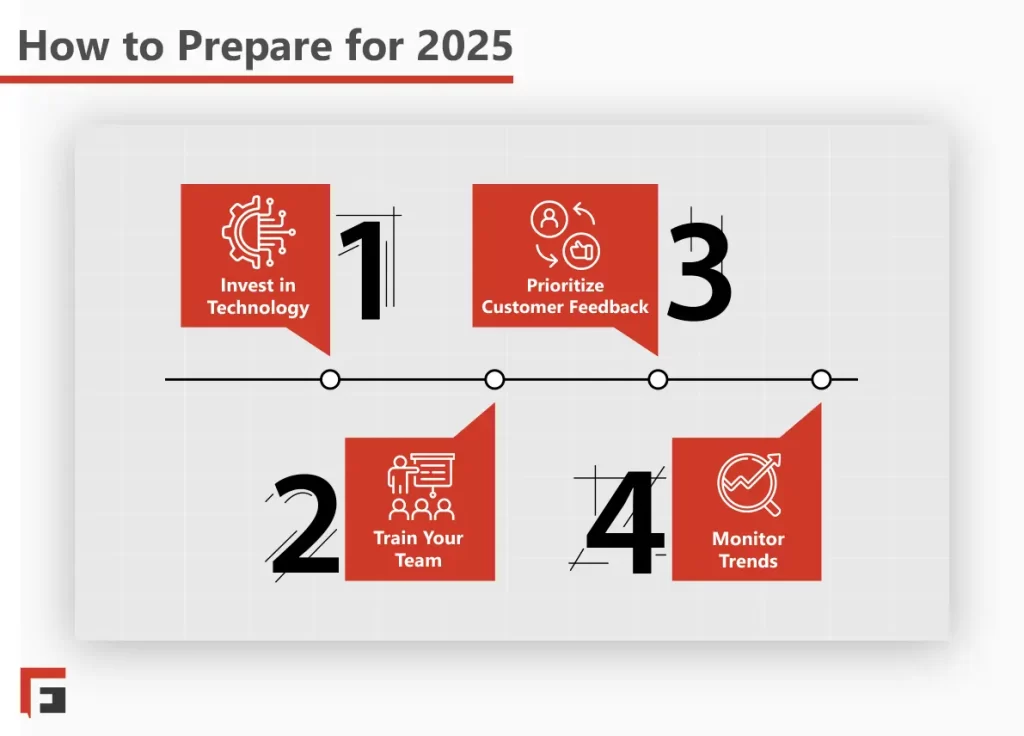
Customer Experience Trends: What Will Change in 2025? Get Ahead of the Game!
| Author: | Hagar Hadad |
|---|---|
| Last updated: | |
| Categories: | Customer Experience |
| Reading time: | 14 mins |
The landscape of customer experience is not static; it’s a dynamic world that’s influenced by rapid developments in technology. Right now, every interaction between a customer and a brand must be seamless, intuitive, and deeply personalized. This means going beyond traditional customer service and embracing a different approach that considers the entire customer journey.
2025 is almost here, and it is expected that there will be more customer experience trends to come that will reshape how companies engage with their customers. It’s important for companies to leverage this evolving landscape to improve their customer interactions. The journey towards customer experience transformation is not merely a simple destination; it’s an ongoing commitment and journey to understanding and responding to the ever-changing needs of your audience.
What is Customer Experience?
The concept of customer experience contains every interaction a customer has with a brand, from marketing to post-purchase support. The importance of keeping up with customer experience trends cannot be stated enough; it has become a crucial differentiator in today’s market. According to research, companies with a customer experience mindset drive revenue 4-8% higher than the rest of their industries.
Customer expectations evolve, and so must the future of customer experience. Today’s consumers are knowledgeable and often equipped with extensive information at their fingertips. They demand more than just a transaction; they seek meaningful interactions that reflect their values and lifestyles. This shift has led to a growing emphasis on evolving customer experience technology, where customers expect tailored experiences that resonate with their individual needs.
In addition, the rise of social media is one of the most important customer experience trends that has transformed the way customers interact with brands. Customers now have platforms to voice their opinions, share their experiences, and connect with like-minded individuals. This shift towards transparency means that businesses must be attentive not only to positive feedback but also to criticism. A survey showed that companies that actively collect and act on customer feedback report a 20% increase in customer satisfaction and a 15% improvement in customer retention.
The Importance of Customer Experience Management
Customer experience management is important for any organization looking to thrive in today’s market. It involves keeping up with customer experience trends and understanding and optimizing the various interactions a customer has with a brand, from awareness to post-purchase support. Effective customer experience outsourcing management leads to higher customer satisfaction and drives customer loyalty, which is essential for long-term business success.
Companies that excel in customer experience management can differentiate themselves from their competitors, making them stand out. Customers are more likely to choose a brand that delivers exceptional experiences.

Customer Experience Trends: What to Expect in 2025
- Personalization
Customer experience in 2025 will heavily lean towards personalization. With advancements in data analytics and artificial intelligence (AI), companies will have the tools to deliver highly personalized experiences to their customers. According to McKinsey, 71% of consumers expect companies to deliver personalized interactions, and 76% become frustrated when this doesn’t happen.
To stay competitive, brands should invest in customer experience technology that allows for the collection and analysis of customer data. This will play a huge role in staying up to date with customer experience trends. Personalization is not just name recognition in emails anymore; it involves understanding a customer’s journey and preferences in real time.
Companies will need to leverage data from various touchpoints, including website interactions, purchase history, and social media engagement, to create a 360-degree view of the customer. This perspective enables businesses to anticipate needs and deliver relevant content or products at the right moment as a part of the customer experience transformation.
- Omnichannel Support
The future of customer experience also relies on seamless omnichannel engagement, which is considered one of the most important customer experience trends. Customers today interact with brands through various ways, including websites, social media, mobile apps, and physical stores. By 2025, companies will need to provide a cohesive experience across all channels to compete with others.
To implement customer experience transformation, businesses need to integrate their systems and data across platforms. A unified customer profile allows for better tracking of interactions and a more tailored approach, which will eventually increase engagement. The main aim of omnichannel engagement is to provide customers with the flexibility to switch between channels without losing the context of their interactions.
For example, a customer might start a conversation via social media, receive assistance through a chatbot, and finalize a purchase on the company’s website. Ensuring that all channels are interconnected and information is readily available will significantly enhance customer satisfaction. This is why omnichannel support is one of the most needed customer experience trends, as it is the easiest way to retain customers.
- Proactive Customer Service
The shift from a reactive to a proactive approach is important and inevitable in 2025. This means anticipating customer needs and addressing potential issues before they arise. By using customer experience technology such as AI-driven chatbots and predictive analytics, companies can provide timely support and solutions.
Research has shown that 38% of customers are more likely to recommend a company or a brand if it has good consumer service, and an important part of this is solving issues before they turn into a problem. Chatbots, for example, can analyze customer behavior and identify potential problems, allowing brands to reach out with solutions before the customer even realizes there’s an issue. This proactive approach in the customer experience trends not only enhances customer satisfaction but also builds trust and loyalty.
When customers feel that a brand understands their needs and acts on them, their overall experience improves significantly, increasing retention rate. In fact, enhancing customer retention by 10% has the potential to boost the company’s value by as much as 30%, according to the Harvard Business School.
Also, training customer service representatives to recognize patterns in customer interactions can further improve this proactive strategy. If a customer frequently contacts support about a specific issue, representatives can take the initiative to provide relevant solutions or guidance during their next interaction, making this one of the most useful customer experience trends in 2025.
- Increased Use of AI and Machine Learning
Artificial intelligence and machine learning will play a huge role in the future of customer experience. By analyzing vast amounts of data, AI can help businesses understand customer preferences, predict future behaviors, and automate various processes. For example, companies can use machine learning algorithms to analyze customer feedback, identify trends, and adjust their strategies accordingly.
This level of responsiveness will be crucial for businesses aiming to improve their customer experience transformation. Also, automated tools can handle basic inquiries, allowing human representatives to focus on more complex issues, which, in turn, improves efficiency and satisfaction.
Moreover, the integration of AI in customer experience extends to personalization, where algorithms can recommend products or services based on historical data, merging two important customer experience trends together. This leads to a more relevant experience, further enhancing customer loyalty and driving repeat purchases.
- Voice Technology
The growing use of voice-activated devices means that businesses must adapt to include voice technology in their customer experience transformation. By 2025, customer experience will see an increase in the use of conversational interfaces, such as voice assistants, to facilitate easier interactions. Brands can develop voice-activated applications to enable customers to place orders, ask questions, or receive support without the need for traditional platforms.
- Focus on Data Privacy and Security
As businesses collect more customer data to improve personalization, one of the most important customer experience trends must be to prioritize data privacy and security. Customers are becoming increasingly concerned about how their information is used and shared. In 2025, brands will need to navigate the complexities of data protection regulations and build trust with their customers.
Transparent communication about data usage, alongside robust security measures, will be essential to build trust between the company and its customers. Businesses that have made privacy a key part of their brand identity have resonated with consumers who value their data security. By promoting a culture of privacy and respect for customer data, brands can foster trust and loyalty.
Customers are more likely to engage with brands they trust, making data security a critical component of customer experience trends. Implementing strong cybersecurity measures and maintaining compliance with regulations will protect the business and improve the overall customer experience.
- Employee Experience as Part of Customer Experience
Organizations will increasingly recognize the relationship between employee experience and customer experience. Happy and engaged employees are more likely to provide exceptional service. Therefore, companies will invest in employee training, well-being, and development, understanding that a motivated workforce directly impacts customer satisfaction.
Additionally, organizations will adopt a similar approach to customer feedback for employees, using surveys and performance metrics to improve satisfaction and engagement levels, ultimately making it one of the most important customer experience trends. This data will enable brands to identify areas for improvement and tailor initiatives to address employee concerns. For instance, if feedback indicates that employees feel overwhelmed by workloads, organizations might explore options such as redistributing tasks or hiring additional staff.
Real-Life Examples of Companies Using Customer Experience
Several companies went through customer experience transformation and have seen tangible benefits from their efforts.
Amazon
Amazon has set the gold standard for customer experience in the e-commerce space. It uses customer experience technology and the latest customer experience trends to create a seamless and personalized shopping journey. Through advanced algorithms and data analytics, Amazon tailors product recommendations based on individual browsing and purchase history, enhancing the shopping experience.
Their user-friendly platform allows customers to navigate easily, with features like one-click purchasing streamlining the checkout process. Moreover, Amazon’s commitment to exceptional customer service is evident in its hassle-free return policy and 24/7 support, ensuring customers can get help whenever they need it.
Apple
Standing out as a pioneer in crafting immersive customer experiences, Apple’s retail stores are designed to encourage exploration, inviting customers to interact with products hands-on while being supported by knowledgeable staff. Apple’s integrated ecosystem of devices works seamlessly together, enhancing customer satisfaction through applying customer experience trends.
Airbnb
Airbnb is another example of a company that has transformed the travel and hospitality industry by prioritizing customer experience technology. By focusing on community and connection, Airbnb allows users to not only find accommodation but also to enjoy local cultures. The platform encourages hosts to create unique, personalized experiences for guests, often sharing local tips and recommendations. This personal touch fosters a sense of belonging, making travelers feel more like locals rather than mere tourists.
In addition, Airbnb uses user-generated content through reviews and ratings, enabling potential guests to make informed decisions based on previous experiences. This transparency and keeping up with customer experience trends build trust within the community and encourage hosts to provide exceptional service to maintain positive reviews.
Additionally, Airbnb’s customer support is accessible and responsive, with resources to help both hosts and guests resolve any issues quickly. The platform also offers a set of tools for hosts, helping them optimize their listings and improve guest experiences, which ultimately improves the overall service quality.

How to Prepare for 2025
As we approach 2025, it’s crucial for businesses to prepare. Here are actionable steps to stay ahead of the customer experience trends:
Invest in Technology
Integrate customer experience technology that enables data collection and analysis, supports omnichannel engagement, and improves personalization. Consider solutions like CRM systems, AI-driven analytics, and customer feedback platforms.
Investing in technology is not just about purchasing tools; it’s about creating a complete ecosystem where these tools can communicate and enhance the overall experience. This might require restructuring internal processes to maximize the benefits of these technologies.
Train Your Team
It’s important to ensure that your team is equipped with the skills and knowledge to navigate the changing customer experience landscape. Providing training on new technologies and emphasizing the importance of empathy in customer interactions are ways of keeping up with customer experience trends.
Prioritize Customer Feedback
Establish mechanisms for collecting customer feedback regularly. Use this data to make informed decisions and drive improvements in your customer experience transformation efforts. Consider implementing NPS (Net Promoter Score) surveys, post-purchase feedback forms, and social listening tools. The insights gathered can guide development, service improvements, and marketing strategies.
Monitor Trends
Stay informed about emerging customer experience trends and technologies. Regularly review industry reports and attend conferences to keep up with changes that could affect your business.
Participating in industry forums and networks can provide valuable insights into how competitors are adapting their strategies. Networking with other professionals can also lead to innovative ideas that can be implemented in your organization.
FlairsTech shows a commitment to exceptional customer experience by prioritizing client satisfaction as a core value. The company offers multilingual agents available 24/7, ensuring that clients can access support whenever they need it, regardless of time zone or language barriers. This round-the-clock service enhances the customer experience by providing timely assistance and fostering trust.
Our agents are trained to understand and address client needs effectively, offering tailored solutions that align with specific requirements. By prioritizing communication and responsiveness and keeping up with customer experience trends. FlairsTech creates a supportive environment where clients feel valued and understood, ultimately driving higher levels of satisfaction and loyalty. Contact us now and schedule a free consultation with one of our technical experts to discuss your needs, challenges, and goals.
Understanding customer experience is vital for brands seeking to differentiate themselves in a crowded market. By prioritizing customer satisfaction and aligning their strategies with evolving consumer expectations, businesses can create a loyal customer base that drives long-term success. The proactive embrace of these trends will not only enhance customer engagement but also position brands as forward-thinking leaders in the ever-evolving landscape of customer experience.
Frequently Asked Questions
- What is customer experience?
Customer experience (CX) refers to the overall perception a customer has of a brand based on their interactions throughout the customer journey. This includes every touchpoint, from initial awareness and purchasing to post-sale support and service. A positive customer experience can lead to increased customer loyalty and repeat business.
- Why is customer experience important for businesses?
Customer experience is crucial because it directly impacts customer satisfaction, loyalty, and retention. A positive experience can differentiate a brand from its competitors, leading to word-of-mouth referrals and increased revenue. Companies that prioritize customer experience are also better equipped to adapt to changing customer needs and preferences.
- What is the latest customer experience trends?
Current customer experience trends include personalization through data analytics, the integration of artificial intelligence and chatbots for customer support, omnichannel strategies that provide seamless experiences across platforms, and a greater emphasis on emotional connections with customers. Brands are also focusing on employee experience as a way to enhance customer satisfaction.
- What is customer experience transformation?
Customer experience transformation refers to the strategic changes a company implements to improve the overall experience it offers.
- How can companies improve customer experience?
Companies can improve customer experience by actively seeking customer feedback, personalizing interactions, keeping up with customer experience trends, investing in employee training, and leveraging technology to streamline processes. Building a customer-centric culture and continuously analyzing customer data can also help identify areas for improvement.
- What are the best practices for measuring customer experience?
To measure customer experience effectively, businesses can use tools such as Net Promoter Score (NPS), Customer Satisfaction Score (CSAT), and Customer Effort Score (CES). Conducting regular surveys, analyzing customer feedback, and monitoring online reviews are also crucial for gaining insights into the customer experience.
- What future trends should we expect in customer experience?
In 2025, we can expect trends such as increased use of artificial intelligence for personalization, the rise of voice-activated customer service, a focus on sustainability and social responsibility, and greater emphasis on mental health and well-being in customer interactions. Brands will also likely prioritize data privacy and security as customer concerns grow.







